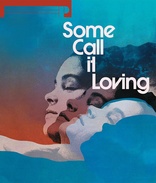Some Call It Loving Blu-ray Movie
HomeSome Call It Loving Blu-ray Movie 
Sleeping BeautyEtiquette Pictures | 1973 | 103 min | Not rated | Jul 14, 2015
Movie rating
6.6 | / 10 |
Blu-ray rating
| Users | 0.0 | |
| Reviewer | 4.0 | |
| Overall | 4.0 |
Overview
Some Call It Loving (1973)
A woman who's been asleep for years is part of a carnival that sells her kisses for a buck. A lonely jazz musician buys her. Once awake, the two of them and his two girlfriends hook up. But sometimes, dreams are better than reality.
Starring: Zalman King, Carol White, Tisa Farrow, Richard Pryor, Veronica Anderson (I)Director: James B. Harris
| Drama | 100% |
Specifications
Video
Video codec: MPEG-4 AVC
Video resolution: 1080p
Aspect ratio: 1.78:1
Original aspect ratio: 1.85:1
Audio
English: DTS-HD Master Audio Mono
Subtitles
English SDH
Discs
50GB Blu-ray Disc
Two-disc set (1 BD, 1 DVD)
Playback
Region A, B (C untested)
Review
Rating summary
| Movie | 3.5 | |
| Video | 4.0 | |
| Audio | 3.5 | |
| Extras | 4.0 | |
| Overall | 4.0 |
Some Call It Loving Blu-ray Movie Review
Reviewed by Brian Orndorf July 10, 20151973’s “Some Call It Loving” is an expansion of a John Collier short story. A reimagining of “Sleeping Beauty,” the feature erases all fairy tale hope to toy with sexual and emotional gamesmanship, studying the psychological fallout of love when it confronts the submission of fantasy. Written and directed by James B. Harris (“The Bedford Incident,” “Cop”), “Some Call It Loving” attempts to conjure a mood of mystery and seduction, gradually revealing its illness as the story unfolds. It’s an odd one, designed with esoteric intent to fit an experimental decade of filmmaking. However, it’s richly made with a true sense of allure to go along with its equally impressive handle on repulsion, making it a sure bet for cineastes who crave the feeling of a honeyed submersion into idiosyncrasy and kink.
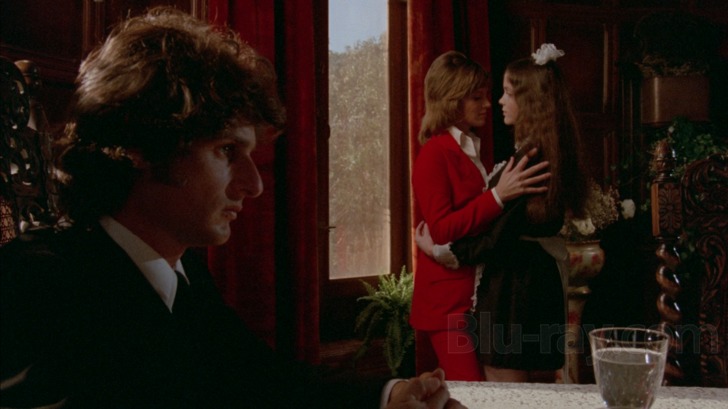
Robert (Zalman King) is a man with a taste for fantasy, engaging in an elaborate relationship of role playing with Scarlett (Carol White), with the pair making a home for themselves inside a mansion, where they conduct their games of performance in private, joined by submissive Angelica (Veronica Anderson). At the local carnival, Robert comes across a freak show display involving “The Sleeping Beauty,” discovering a young woman named Jennifer (Tisa Farrow) who’s been sedated for eight years, left to snooze while her handlers establish a kissing booth featuring the comatose girl. Buying Jennifer and bringing her home, Robert grows fascinated with his latest toy, embarking on a series of dates with the seemingly innocent stranger while Scarlett begins her training, shaping their latest acquisition into a plaything eager to join the house’s strange appetites in exhibition and domination.
“Some Call It Loving” is a difficult film to describe, as it doesn’t reach any recognizable emotional peaks. Instead, it’s a meditative movie, with Harris building an atmosphere of observation as Robert brings Jennifer into his seemingly simplistic life of role play. In the mansion, Scarlett masterminds situations of askew eroticism to summon the necessary spell, offering situations of grief and superiority, while providing taboo images of repression, including dressing as a nun, to fully stroke the house’s appetite for fetishistic encounters. It’s a madhouse, but a tastefully inhabited one, finding Robert and Scarlett refined personalities, embracing their lifestyle with non-confrontational routine, which eases participation from outsiders, including Angelica and eventually Jennifer.
The picture is filled with highly disturbing content, yet Harris passes on an exploitative approach, instead treating Robert and Scarlett’s lifestyle as normality within their walls, never judging their conduct, even when it teases cruelty. “Some Call It Loving” certainly isn’t an endearing feature, but it shows patience with uncomfortable situations, including Robert’s initial discovery of Jennifer at the carnival, where this “Sleeping Beauty” is being sold for a dollar at a time, with enthusiastic men standing in line to plant a kiss on her, while others are offered more than just a smooch after the freak show closes. However, Robert’s relationship with Jennifer isn’t built on protective instincts, but overwhelming curiosity with what begins as something of a social experiment. Feelings begin to develop between Robert and Jennifer as they embark on private time together, including visits to a jazz club where he moonlights as a saxophonist, but the trick of the movie concerns a level of trust. Is Robert truly letting his guard down with Jennifer? Is it all just another game played with Scarlett? It’s difficult to find authentic feelings in “Some Call It Loving,” which appears to play into Harris’s overall narrative design. It can be frustrating to watch, but the film is effective when it comes to establishing a dreamy atmosphere and moments of mental illness, seducing the viewer with sexuality while identifying lines crossed as Jennifer looks to Robert and Scarlett in a weirdly parental manner, highlighting her stunted adolescence.
Performances ease “Some Call It Loving” along, with White particularly effective as Scarlett, wielding authority that sells the fantasy, allowing the ongoing manipulation to make sense in a way, especially with Robert’s passive and isolated nature, which is sold through King’s contemplative performance. Farrow brings deceptively childlike qualities to Jennifer that adds to the mix of disease, making the character more of a willing participant than she initially lets on. Perhaps the most famous cast member is Richard Pryor, who contributes a few scenes as Jeff, Robert’s unbearably alcoholic friend. While I respect the novelty of seeing Pryor in a dramatic role, his stumbling antics become a distraction.
Some Call It Loving Blu-ray Movie, Video Quality 
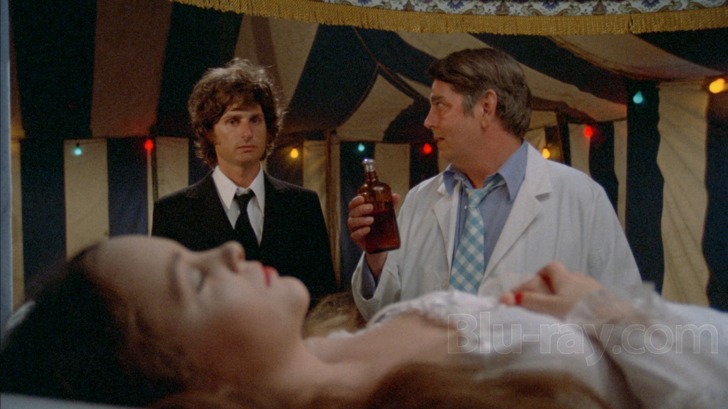
The AVC encoded image (1.78:1 aspect ratio) presentation carries a defined softness, with gauzy cinematography presenting a dreamlike atmosphere that doesn't encourage traditional HD sharpness. The viewing experience is filled with glowing, blooming lights, and detail is generally satisfactory, exploring facial particulars and interior expanse, while costumes carry acceptable textures, some preserving their sheer construction. Colors are superb, with direct primaries and healthy skintones, while carnival and jazz club lighting offers a more significant punch. Delineation is true to period standards, with deeper blacks losing some degree of definition. Grain is extremely heavy, but managed to filmic standards. Some speckling remains, and blue discoloration appears periodically on the sides of the frame. No overt damage is detected.
Some Call It Loving Blu-ray Movie, Audio Quality 
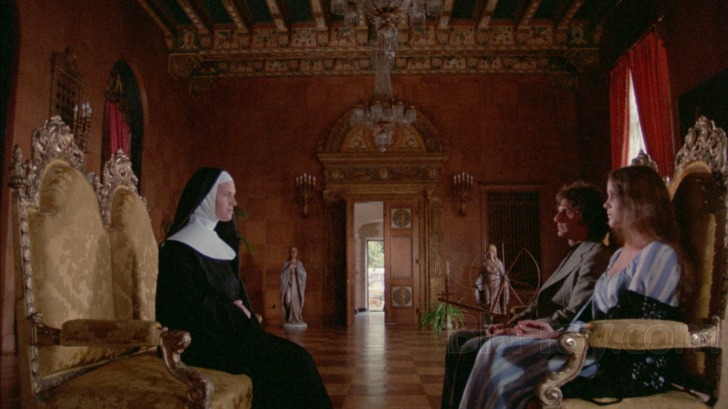
The 1.0 DTS-HD MA sound mix shows some age, with hiss running throughout the listening experience, and highs are on the sharper side. Intelligibility is never a problem, with dialogue exchanges handled to satisfaction, managing performance choices and the general hushed moods of the feature. Music is acceptable, supportive and evocative, while soundtrack cuts are more pronounced, including jazz performance sequences. Atmospherics are dialed down but still present.
Some Call It Loving Blu-ray Movie, Special Features and Extras 
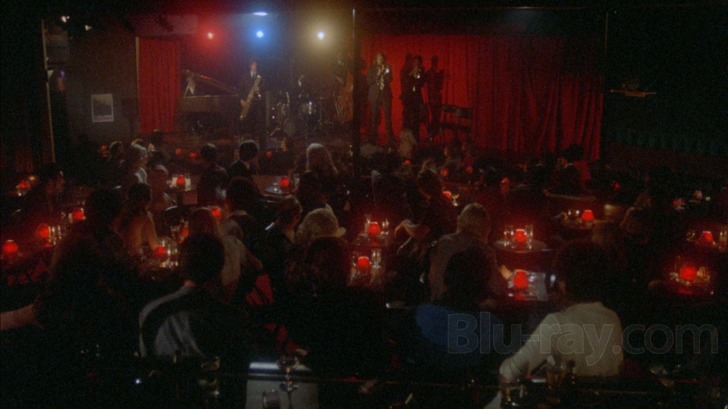
- Booklet (6 pages) features an essay by Kevin John Bozelka.
- Commentary features director James B. Harris and Sam Prime.
- "Some Call It History" (6:52, HD) is an interview with Harris, who recounts his early years in the Korean War, where he met Stanley Kubrick, going on to collaborate with the director on films such as "The Killing," "Paths of Glory," and "Lolita." A lover of cinema, Harris is passionate about his profession, recounting the development period of "Some Call It Loving" and how the movie was received during its initial release.
- "A Dream So Real" (8:27, HD) is a conversation with cinematographer Mario Tosi, who shares his thoughts on career choices, still regretful that he passed on shooting "Easy Rider." Talk of "Some Call It Loving" is offered, including anecdotes about Richard Pryor's restless energy.
- Outtakes (15:55, HD) are presented without sound, offering commentary by Harris and Prime to explain the deleted footage. While the collection is mostly superfluous character beats, there is a minor subplot concerning Robert's trip to attend his mother's funeral that would've substantially altered the feature's intimacy.
- A Theatrical Trailer has not been included.
Some Call It Loving Blu-ray Movie, Overall Score and Recommendation 
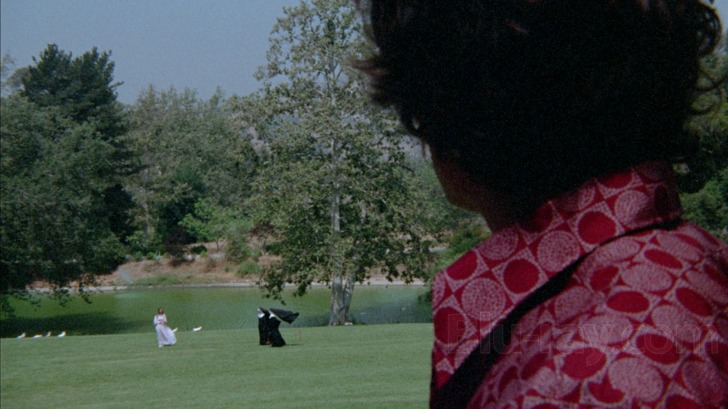
"Some Call It Loving" dips into abstract imagery and periodic indulgence, introducing a David Lynch vibe during passages concerning Scarlett's interest in tap dance performance with Angelica while wearing a sheer habit. It's a peculiar picture from any direction, but Harris keeps the story contained, encouraging intimacy that eases comprehension of motivation and concentration, allowing Robert to be more of a complex character than other filmmakers would allow. "Some Call It Loving" is meant for a specific moviegoing mood, but its reward is a careful depiction of fantasy that dips into the unreal, working towards an unusual portrait of cautious perversion that teases moments of conventional romance.
Similar titles
Similar titles you might also like

Daniel
1983

Emanuelle in Bangkok
Emanuelle nera: Orient reportage
1976

Wild Reeds
Les roseaux sauvages / Slipcover in Original Pressing
1994

The Woman Next Door
La Femme d'à côté
1981

Wild Tigers I Have Known
Standard Edition
2006

Butterfly Kiss
Killer on the Road
1995

Spider
2002

The Swimmer
Deluxe Edition
1968

Private Vices, Public Virtues
Vizi privati, pubbliche virtù
1976

David and Lisa
1962

Miral
2010

Went to Coney Island on a Mission From God… Be Back by Five
1998

Night Falls on Manhattan
Limited Edition
1996

Mass
2021

Krisha
Signed Limited Edition to 100 Copies - SOLD OUT
2015

Secret Ceremony
1968

Blancanieves
Snow White
2012

Under the Sand
Sous le sable
2000

Bartleby
1970

Little Buddha 4K
1993
